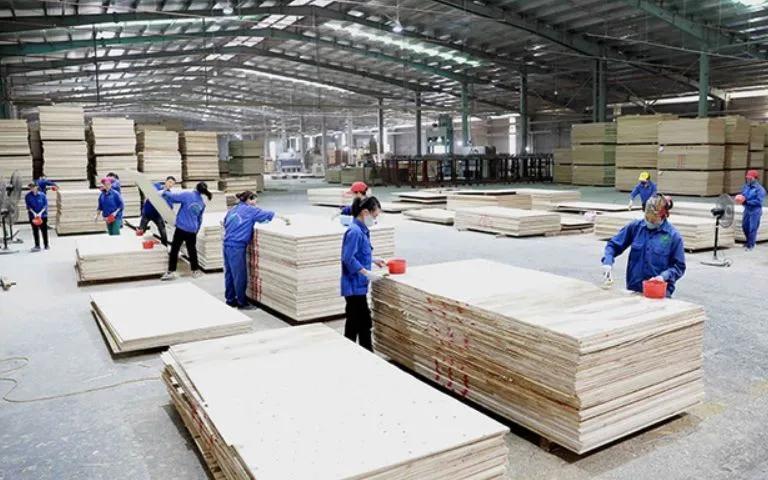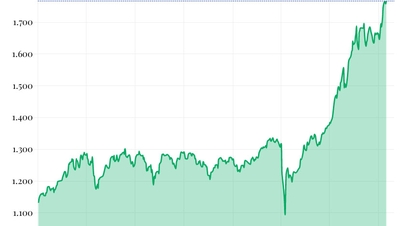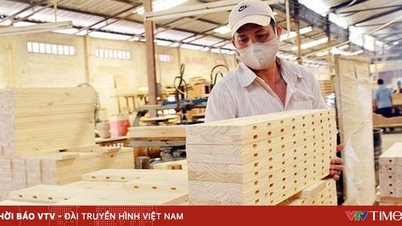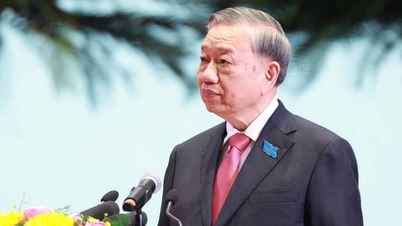
Wood imported into the US will be subject to new taxes.
The Trump administration’s new tariffs on imported wood, furniture, and kitchen cabinets officially took effect yesterday (October 14). These tariffs are part of a series of sector-specific tariff measures that Trump has implemented since returning to power.
Accordingly, the US imposes a 10% tax on imported softwood, while upholstered furniture and kitchen cabinets are subject to a starting tax rate of 25%.
From 1 January 2026, tariffs on upholstered furniture will rise to 30%, while kitchen and bathroom cabinets could be subject to tariffs of up to 50%. However, timber products from the UK will not be subject to tariffs of more than 10%, while imports from the European Union (EU) and Japan will be subject to a cap of 15%.
According to Capital Economics, the US currently imports 27% of its furniture output from China, nearly 20% from Vietnam and a similar proportion from Mexico.
US tariffs affect Vietnam's wood industry
The new US tariffs mean that, from October 14, Vietnamese wooden products and furniture exported to the US market will also be subject to a tax of up to 25%. This tax will affect the revenue and competitiveness of businesses, as well as put pressure on this year's export target of this key industry.
The tariffs imposed by the US will also continue to increase sharply from the beginning of next year, putting great pressure on countries exporting wood and furniture to the US, including Vietnam, forcing businesses to recalculate their market strategies and supply chains.
In the long term, the Vietnam Timber and Forest Products Association encourages Vietnamese businesses to increase the use of US wood materials in production. Experts also recommend that the wood industry promote market diversification, targeting Europe, Japan, Australia, Canada, the Middle East and China to offset the decline in the US. This is also an opportunity for restructuring: Targeting the high-end segment with products that meet international standards, have distinctive designs and strong brands.
Ministry of Industry and Trade holds phone talks with US Trade Representative
Regarding the new US tax on wooden furniture, at 7:00 p.m. on October 14 (Vietnam time), Deputy Minister of Industry and Trade Nguyen Sinh Nhat Tan, Deputy Head of the Government Negotiation Delegation on the Reciprocal Trade Agreement with the US, had an online phone call with Mr. Bryan R. Switzer, the new Deputy US Trade Representative. The exchange took place in a frank, open and constructive atmosphere.
The Vietnamese representative affirmed that Vietnam always considers the US as a top important strategic partner; at the same time, he emphasized that Vietnam wishes to continue to closely coordinate with the US to promote the negotiation process of the Reciprocal Trade Agreement in a fair, balanced and mutually beneficial direction, thereby enhancing understanding, consolidating strategic trust and contributing to maintaining stability and sustainable development in bilateral relations.
The US side positively assessed the current cooperation process, saying that although there are still some technical issues that need to be further discussed, negotiations between the two sides are proceeding smoothly with effective coordination at all levels from the Minister, Deputy Head of the Negotiating Delegation to technical expert groups.
The two sides agreed to continue to maintain regular exchanges and work towards reaching a reciprocal trade agreement that is in line with the interests and priorities of both countries.
Source: https://vtv.vn/my-ap-thue-voi-do-noi-that-nganh-go-viet-nam-bi-anh-huong-ra-sao-100251015152206571.htm



![[Photo] Conference of the Government Party Committee Standing Committee and the National Assembly Party Committee Standing Committee on the 10th Session, 15th National Assembly](https://vphoto.vietnam.vn/thumb/1200x675/vietnam/resource/IMAGE/2025/10/15/1760543205375_dsc-7128-jpg.webp)


![[Photo] General Secretary To Lam attends the 18th Hanoi Party Congress, term 2025-2030](https://vphoto.vietnam.vn/thumb/1200x675/vietnam/resource/IMAGE/2025/10/16/1760581023342_cover-0367-jpg.webp)
































![[Video] TripAdvisor honors many famous attractions of Ninh Binh](https://vphoto.vietnam.vn/thumb/402x226/vietnam/resource/IMAGE/2025/10/16/1760574721908_vinh-danh-ninh-binh-7368-jpg.webp)






































































Comment (0)